|
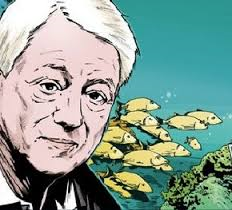 |
2014 / Call for Papers / Upcoming Permanent Seminar Conferences
The Permanent Seminar on Histories of Film Theories is very pleased to present the Call For Papers for its 2014 Conference: Critical Theory, Film and Media: Where is “Frankfurt” now?
, February 17, 2014
|
| The Permanent Seminar on Histories of Film Theories is very pleased to present the Call For Papers for its 2014 Conference: Critical Theory, Film and Media: Where is “Frankfurt” now? CFP below, and our online CFP abstract submission form follows at bottom. See you this summer in Frankfurt! ********* Call for papers – deadline February 28, 2014 Critical Theory, Film and Media: Where is “Frankfurt” now? An international conference at Goethe Universität Frankfurt, Germany, August 20 through 24, 2014, organized by the Institut für Sozialforschung and the Institut für Theater-, Film- und Medienwissenschaft in cooperation with the Permanent Seminar on Histories of Film Theories. In 2010, Alexander Kluge releases a DVD called “Wer sich traut, reißt die Kälte vom Pferd” (Those who dare tear the cold down from his horse), the third installment in a series that started with a ten-hour film based on Eisenstein’s project of filming Marx’ “Das Kapital”. Picking up on an unfinished project developed with Adorno in 1967 on the theme of coldness, the 2010 DVD presents a media mix of 31 different types of short films and 41 stories in an accompanying booklet. The project is a collaboration between 12 artists, scholars and experts from various disciplinary backgrounds, two of them being fictive characters. Reading theory has become a collaborative effort, involving various disciplines on different platforms, and dealing with unfinished projects. About the project Kluge writes: “The possibility of a revolution in Europe has disappeared, and with it the confidence in a historical process that can be directlyshaped by people’s consciousness. With this confidence, a certain unrest and urgency have disappeared. … As if in a quiet garden we can now study strange thoughts from [x] and weird projects from [y], because they are like messages from an ideological antiquity. … We do not have to announce anything new, we do not have to pass final judgments, can change little and do not have to imitate [x] or [y]. One can see this as a goodbye, or as a beginning.” Kluge then goes on to make a statement about Marx that we could paraphrase for our purposes in the following way: “The analytical instruments of the Frankfurt school are not outdated. … Sifting through the rubble of history we find useful tools.” With a combination of social philosophy, philosophical aesthetics, political economics and a particular focus on technology the Frankfurt school and its kindred spirits Benjamin and Kracauer have paved the way for film and media studies as a critical discipline. Now, at a time, when the generational project of 1968, the march through the institutions under the assumption that a revolution in Europe is possible, has largely run its course, it is time to sift through the rubble of history, collect the tools, pick up on unfinished projects and think about new beginnings. What, then are the analytical instruments that the Frankfurt school provided that will be useful going forward? How did the Frankfurt School of critical theory shape the course of film and media theory in the 20th century, and how will its tools continue to shape the study and critical analysis of media and culture? „Critical Theory, Film and Media: Where is ‘Frankfurt’ now?“, an international conference organized by the Institut für Sozialforschung and the Institut für Theater-, Film- und Medienwissenschaft in cooperation with the Permanent Seminar on Histories of Film Theories (filmtheories.org), proposes to address these questions through a series of panels, keynote lectures and panel discussions. Contributions are welcome on various aspects of critical theory, film and media, from the impact of critical theory on the history of film theory and media studies and film and media practice to debates about media and politics and the continuing relevance of critical theory to postcolonial, queer and other recent strands of cultural theory. In particular, the conference proposes to address, but will not limit itself to, the following areas of study From the critique of the culture industry to the “creative industries”: Without doubt the culture industry chapter of the “Dialectics of Enlightment” is among the most influential texts in the history of film and media theory. Together with Adorno’s notes on cinema in the “Minima moralia” this chapter constitutes a damning indictment of commercialized culture as exemplified most notably by Hollywood cinema. Among other things, with its strong focus on Hollywood, the “Culture industry” chapter laid the groundwork for the institutional histories of Hollywood proposed by the New Film History and continues to echo in current debates about creativity and the “creative industries”. One of the aims of this conference is to trace how the Frankfurt school critique of the culture industry has shaped the study of commercial and popular culture, but also to inquire into the possible continuing relevance of some of the basic tenets of Adorno and Horkheimer’s critique to digital network culture. Essayism, Criticism and Critical Theory: In his famous essay on the “Essay as form” from 1958 Adorno argues for a kind of critical writing that strategically subverts and transgresses disciplinary boundaries. Going back even further, criticism constituted a crucial part of the project of critical theory since its beginnings, whether the film criticism of Kracauer or the music criticism of Adorno. One could argue that film studies emerged as a field in precisely the area carved out by Adorno – indebted to criticism, in a space in between disciplines, borrowing tools and approaches from neighboring field, avoiding for a long time the ossifications of disciplinary protocol. Emerging roughly a decade after film studies, “Medienwissenschaft” occupied a similar trans- or non-disciplinary space. Revisiting the Frankfurt legacy of criticism as theory and of disregarding disciplinary protocol this conference proposes to explore the power and potential of essaysism in the academic study of film and media culture today. Philosophy of History and the History of Media: The Institut für Sozialforschung was created in response to a failed revolution, the German revolution of 1918. Combining Marx with Freud to explain why the revolution did not happen led the Frankfurt school to develop a theory of power and subjectivity of which Foucault later acknowledged that it would would have saved him a lot of trouble had he known about it earlier. The idea of history as process evolving around the possibility of a revolution remained central to later generations of critical theorists. From the outset, Kracauer and Benjamin in particular tied the question of historical process and historical consciousness to the question of media technology, in particular photography and film. In the wake of the emergence of digital network communications and the current transformation of moving image culture the positions the work of Benjamin and Kracauer have re-emerged as key reference in film and media theory. This conference proposes to explore why, even though the urgency that comes with a confidence in history as process has been lost, as Kluge argues, this work appears to be immediately relevant to the study of media and history in contemporary media culture. Critical Theory, Feminist Film Theory and the Politics of Desire: One of the most important and powerful contributions of the Frankfurt School to the field of critical theory in the 20th century consisted in linking the critique of capitalism to sexual politics and the politics of desire. Drawing on the Frankfurt School’s signature combination of neo-marxist analysis with Freudian psychoanalysis, Herbert Marcuse discussed the capitalist system of production in terms of a sublimation of desire in his book 1955 “Eros and Civilization” that an important reference for the generation of 68. Feminist film theory, from Laura Mulvey onwards, emerged in the 1970s from a similar convergence of Freud and Marx (and from Althusser and Lacan), while later approaches to sexual politics and media, from gender studies to queer theory, owe a significant debt to Frankfurt school critical theory in their own ways, in particular to Kluge and Negt’s critique of Habermas’ concept of the public sphere, but also to Benjamin and Kracauer and their interest in the historically changes modes of mediated affect. One of the aims of this conference is to explore how the critique of capitalism and the analysis of sexual politics intersect and re-align in contemporary media culture and in the face of what has variously been called “information capitalism” or “digital capitalism”. Critical Theory, Artistic Practice and the Category of the Art Work: Critical theory, from Benjamin’s works on the theater to his essay on the author as producer and the artwork essay to Kracauer’s film theory and Adorno’s sociology of music has left a significant imprint on film art and on media practice more broadly speaking. German experimental theater and radio in the 1920s, the television programs with avant-garde composes curated by Mauricio Kagel in the 1960s and 1970s and the new German cinema of Kluge and beyond all in varying degrees have use critical theory as a frame of reference. Jean-Luc Godard, a former critic who never ceased to be a critic, continues to acknowledge his debt to critical theory and to Benjamin and Adorno in particular in his work for cinema and television as does, of course, Kluge in his television work. Of particular interest in these examples is a critique of the category of “work” that can be traced back to Adorno but is probably now more relevant than ever. This conference proposes to trace the Frankfurt lineage of the critique of the category of art work across a variety of artistic and media practices. Critical Theory and the Critique of Institutions: The Institut für Sozialforschung was created in the late 1920s as a research institution outside the university, even though it had ties with the University of Frankfurt, which itself had only been founded in 1914. Benjamin’s troubles with academic protocol are well known, and Kracauer consistently worked outside the university until very late in his life. Critical theory emerges outside of, or in tension with, the established institutions of academic life and carries the critique of institutions as its birthmark, so to speak. The Frankfurt school’s critique of institutions further extends to cultural institutions, from Benjamin’s critical analysis of Brecht and Brechtian theater to Adorno’s critique of the practices and institutions of classical music. One of the key legacies of the Frankfurt school is to keep the critique of institutions alive in film and media studies in areas where the focus tends to either be on representations of social and gender roles or on technologies regardless of their institutional dynamics. Critical Theory and Gesture as Interruption: Few other concepts from early critical theory have developed a more virulent afterlife in the theory of theater, film and media than the concept of the “gesture”. Emerging from the theory of language and theater from his early essay on language an the book on the German “Trauerspiel” Benjamin defines “gesture” as a interruption of an action and as the “frozen dialectic” that later becomes a key to his theory of film and of the images, as well as to his readings of Kafka. Roland Barthes draws on Benjamin’s theory of gesture in his analysis of Eisenstein, as does Heiner Müller in his re-readings of Brecht, Jeff Wall in his tableaus or Godard in his “Histoire(s)”. This conference proposes to explore the prehistory and afterlife of this key concept of both critical theory and modern art theory. Critical Theory and the History of Media Technology: Over the last few years a strain of Medienwissenschaft focused on the history technology and particularly computer technology has gained prominence in the Anglophone world under the label “German media theory”. Inspired mostly by the work of Friedrich Kittler and deriving from Heidegger rather than Adorno – or from Freiburg rather than Frankfurt –, this strain of media theory has proposed what we might call “Technohegelianism”, i.e. a philosophy of history as driven by technology and information technology in particular, as an alternative to a critical theory approach to media. This conference intends to explore the relative merits as well as the points of convergence and communication between “German media theory” and Frankfurt School critical theory, with a particular focus on the question of media technology. The conference will be held at the Campus Westend, Goethe-Universität Frankfurt. Proposals for papers and panels should be submitted to before February 28, 2014. Notifications of acceptance will be sent out before March 15, 2014. Scientific committee: Dr. Sidonia Blättler, Institut für Sozialforschung, Frankfurt Prof. Dr. Eva Geulen, professor of German literature, Frankfurt Prof. Dr. Vinzenz Hediger, professor of cinema studies, Frankfurt Prof. Dr. Axel Honneth, director of the Institut für Sozialforschung, Frankfurt Prof. Dr. Rembert Hüser, professor of media studies, Frankfurt Prof. Dr. Nikolaus Müller-Schöll, professor of theater studies, Frankfurt Prof. Dr. Juliane Rebentisch, professor of philosophy and aesthetics, HFG Offenbach Prof. Dr. Marc Ries, professor of media sociology, HFG Offenbach Prof. Dr. Martin Seel, professor of philosophy, Frankfurt Dr. Marc Siegel, assistant professor of cinema studies, Frankfurt To answer the CFP fill out the form below, and for more info contact: frankfurtconference@filmtheories.org |
|
Events

Film-Philosophy Conference 2016
University of Edinburgh
July 6, 2016 – July 8, 2016, July 06, 2016
 |
The Film-Philosophy Conference 2016 will be held at the University of Edinburgh from 6-8 July.
CALL FOR PAPERS
The Film-Philosophy Conference 2016 at the University of Edinburgh invites proposals for presentations on any subject related to film and philosophy. There is no single overall theme.
|


|

FILM & MEDIA 2016. 2016Questions of Cultural Value
The Fifth Annual London Film and Media ConferenceThursday 7 - Saturday 9 July 2016, July 07, 2016
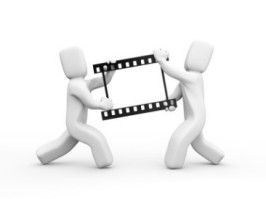 |
We extend a warm invitation to Film and Media scholars worldwide to submit proposals for Papers of 20 minutes’ duration for presentation at FILM & MEDIA 2016: The Fifth Annual London Film and Media Conference. We also welcome proposals for complete Panels of three Papers.
The conference will be held at the Friends’ House Conference Centre, Bloomsbury, London WC1. The UK HQ of the Quaker movement, this beautifully refurbished landmark venue sits opposite Euston Station and is only a few mintes’ walk from St. Pancras and King’s Cross rail stations, the British Library and the British Museum, and the wider delights of the historic Bloomsbury district and the West End.
|


|

Strangers to Ourselves:
“Enemies from Within” and the Moving Image
The Eleventh Tel Aviv International Colloquium on Cinema and Television Studies, December 23, 2015
 |
Distressed by past, current, and emergent civil wars in our region and by an apparently growing chasm between subcultures that are isolated in their own media environments and view others in their community with perplexity and intolerance, the Department of Film and Television at Tel Aviv University invites scholars to submit proposals that critically explore literal and figurative “enemies from within” and their relation to moving images.
|


|

Society for
Phenomenology and Media
18th Annual Conference
Puebla, Mexico. February, 17-19, February 17, 2016
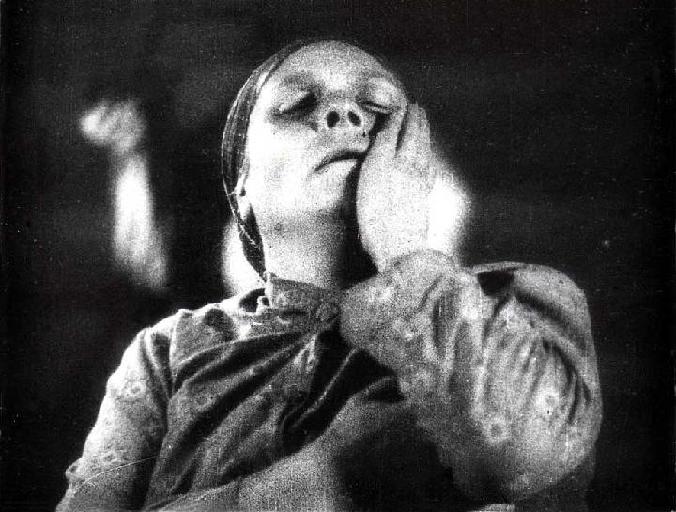 |
Doctoral students are invited to submit proposals, but should note that SPM limits the number of papers from students.
|


|

A Hundred Years of Film Theory
Münsterberg and beyond: Concepts, Applications, Perspectives, June 29, 2016
 |
A century after Hugo Münsterberg´s…
…pioneering publication of 1916, The Photoplay. A Psychological Study, an international and interdisciplinary conference will look at audiovisual media from a broad variety of perspectives and disciplines. The conference will highlight Münsterberg´s achievements as a scholar, who began his academic career at the University of Leipzig before going to Harvard, via the Universities of Heidelberg and Freiburg.
|


|

Virtuality, Becoming and Life
Deleuze Study Conference Rome 2016, July 04, 2015
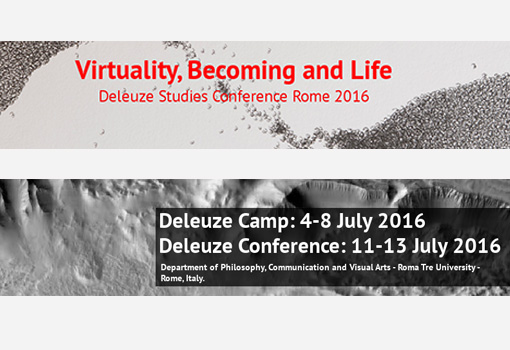 |
The triad of terms in the title is meant to indicate three steps that may build a path through Deleuze's and Guattari's philosophy. This path is but one among the many possible, as the titles of the previous conferences reveal. To borrow a term from psychogeography, we may call it a “desire path”, where desire paths represent the alternate routes created by the walkers’ desires and necessities. Though it is an open path, it is paradoxically coherent and unified. Each of its step indeed refers to the other in more than one way.
The first term –virtuality- refers both to the central issue of time and to the philosophical friendship between Deleuze and Bergson. As Deleuze’s early writings of the Sixties witness, it was a very close friendship which remained vivid also in his later work on cinema in the Eighties. Both Bergson and Deleuze share the common aim to affirm the coexistence and the continuous and mutual interplay between the past and the present, the actual and the virtual. Such an interplay constitute exactly that process of differentiation which grounds the creative dynamics of all different arts, and notably, of cinema.
|


|

FilmForum 2016
XXIII International Film Studies Conference
XIII MAGIS Film Studies Spring School
9 – 15 March, Gorizia, March 09, 2016
 |
FilmForum/MAGIS Spring School is an international film and media studies conference (especially aimed at MA and PhD students and early career researchers) organized by the University of Udine (Italy) in collaboration with: Concordia University, Montreal; Fachhochschule Potsdam; Goethe-Universität, Frankfurt am Main; Université de Lausanne; Université de Montréal; Université du Québec à Montréal; Université Sorbonne Nouvelle – Paris 3; University of Malta.
Inaugurated in 2003, FilmForum has now become one of the most important events in the field of film and media studies, also being considered highly influential across several other disciplines. The School is in fact internationally renowned for its interdisciplinary flair, for the originality of its approaches, and for its cutting edge topics.
For its 2016 edition, FilmForum promotes two research projects
|


|

Viscera, Skin, and Physical Form: Corporeality and Early Cinema
Fourteenth International Domitor Conference
, June 14, 2016
 |
Moving pictures fascinated early audiences by depicting inanimate objects in motion; rolling waves and phantom rides were lasting favorites. First and foremost, however, the film camera captured bodies moving about in everyday life as well as bodies performing for the camera: workers leaving the factory, Sandow flexing his muscles, Annabelle dancing. Film’s wondrous and uncanny capacity to deliver imaginary corporeal presence took advantage of and amplified modernity’s novel forms of body culture. Indeed, even the naming of the medium’s machines and corporations indicated its organic impulse (bio, vita, living, animated). As the medium industrialized and accelerated its intermedial cross-pollination, it supplanted unnamed “models” with stars and superstars while it presented everyday bodies in non-fiction genres. Over time, producers tested storytelling techniques, acting styles, programming approaches, and exhibition practices, thereby negotiating and transforming the relationships between screen bodies and audience response. From the “cinema of attractions” to the feature film, spectatorship has always been corporeal.
|


|

The ICFVCMS 2016. London 18-19/01/2016
18th International Conference on Film, Visual, Cultural and Media Sciences, January 18, 2016
 |
The ICFVCMS 2016 : 18th International Conference on Film, Visual, Cultural and Media Sciences is the premier interdisciplinary forum for the presentation of new advances and research results in the fields of Film, Visual, Cultural and Media Sciences. The conference will bring together leading academic scientists, researchers and scholars in the domain of interest from around the world.
|


|

XXII Udine International Film Studies Conference
Udine, March 18-20, 2015
A History of Cinema without Names: A Research Project, March 18, 2015
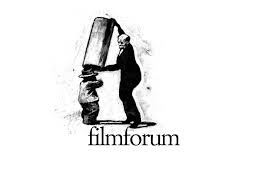 |
In several occasions the Udine Conference has focused on the problematization of the notion of the “author” and on a re-definition of
the notion of “style” (separating this notion from any property related to individual poetics and from any – anthropomorphically conceived –
principle of textual construction). In this perspective, it is indeed possible to articulate models aimed at understanding authorial poetics as the
momentary unification of features that exceed them. On another level, genres as well could be simply seen as spaces in which elements of the
same kind aggregate
|


|

CFP Fata Morgana, Quadrimestrale di Cinema e Visioni, n.26
"Teoria", August 01, 2014
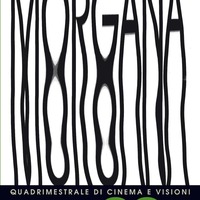 |
Le trasformazioni recenti del cinema, i mutamenti tecnologici, il proliferare di linguaggi contigui a quello cinematografico e il variare dei modi di fruizione, impongono oggi una riformulazione di tutti quegli approcci teorici che nel corso dei decenni hanno contribuito prima a isolare l’oggetto cinema, poi a individuarne caratteri e specificità.
|


|

2014 / Call for Papers / Upcoming Permanent Seminar Conferences
The Permanent Seminar on Histories of Film Theories is very pleased to present the Call For Papers for its 2014 Conference: Critical Theory, Film and Media: Where is “Frankfurt” now?
, February 17, 2014
 |
CFP below, and our online CFP abstract submission form follows at bottom. See you this summer in Frankfurt!
|


|

2014 Chicago and Evanston Conference
The Image in Early Cinema: Form and Material
Thirteenth International Domitor Conference
Chicago and Evanston, Illinois, USA
21-25 June 2014, June 21, 2014
 |
Early cinema emerged within a visual culture that comprised a variety of traditions in art and image making. Even as methods of motion picture production, distribution, and exhibition materialized, they drew from and challenged practices and conventions in, for example, photography and painting.
|


|

SCMS 2014 Conference
Seattle 2014 Call for Paper, Panel, and Workshop Proposals, November 10, 2013
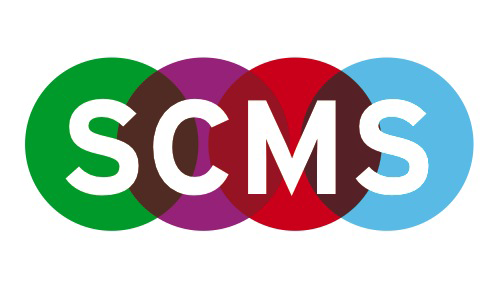 |
The Society for Cinema and Media Studies announces its call for proposals for the 2014 conference. Please join us Wednesday, March 19 through Sunday, March 23, 2014 at the Sheraton Seattle Hotel.
|


|

Rendering (the) Visible II: Figure
February 7-8, 2014 — Moving Image Studies, Georgia State University, February 07, 2014
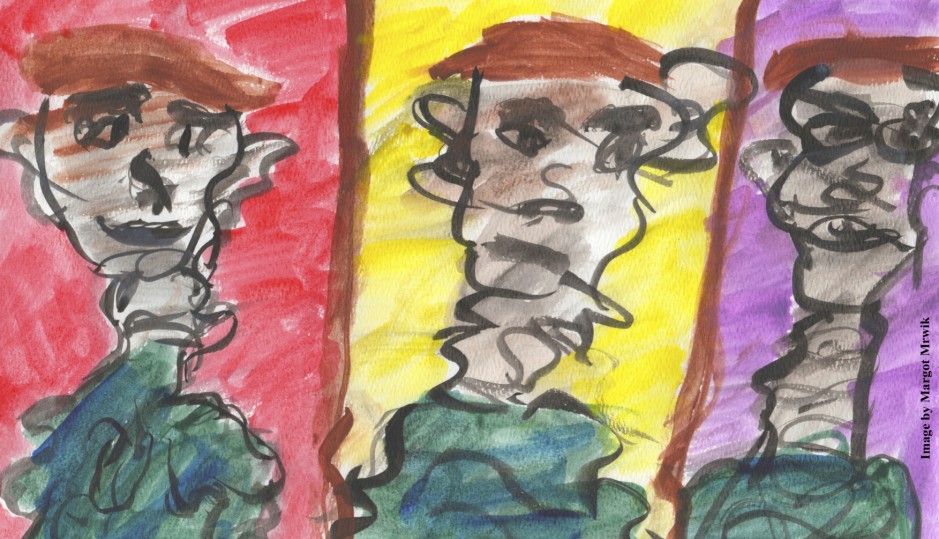 |
The doctoral program in Moving Image Studies at Georgia State University welcomes paper proposals for a meta-disciplinary conference on the concept of the Figure.
|


|

FilmForum 2014 XXI Udine International Film Studies Conference
Udine, April 2-4, 2014
AT THE BORDERS OF (FILM) HISTORY
Temporality, Archaeology, Theories, September 28, 2013
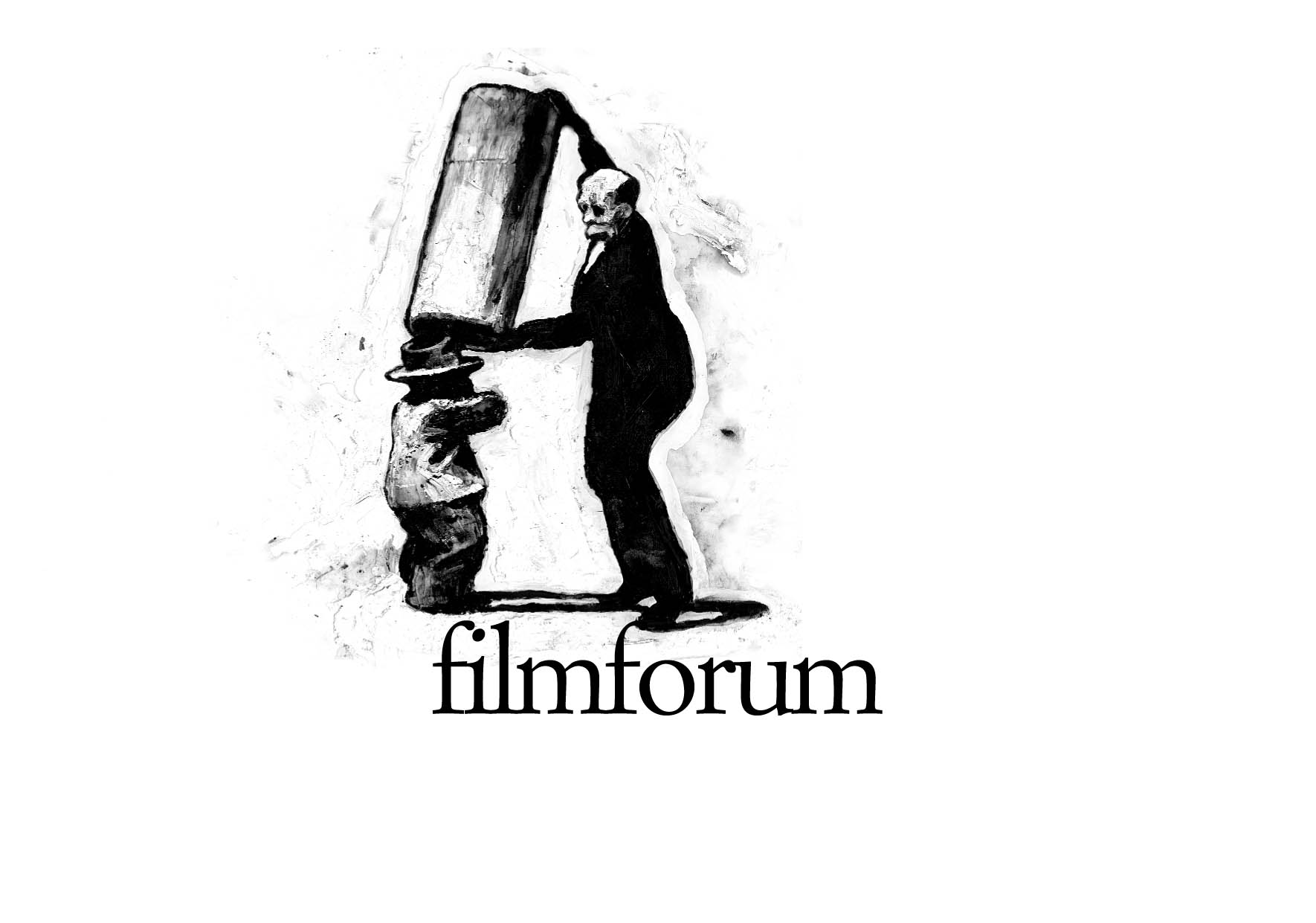 |
The XXI Udine International Film Studies Conference is interested in exploring the concept of historicism in
contemporary media theory, challenging the connections between media theory and media history-making. At The
Borders of (Film) History is expected to explore and map the boundaries between history, theory and theory of history
today. In the latest issue of Film History (Vol. 25, no. 1-2, 2013), Jane Gaines claims: “My skepticism should not imply
that, in taking the ‘historical turn’, we took the wrong turn, but rather that we didn’t ask enough questions about where
we were going.” The “historical turn” represented a fruitful debate in terms of conceptualising history and historicising
theory. It represents a dialectical shift from Film History to Cinema History (as an ensemble of practices, discourses and
dispositifs) and it enlightens the need of rethinking its objects and methodologies. New Film History’s most effective
breakthrough lies in the practice of conceptualising Early Cinema through Foucault-inspired notions like discontinuity,
epistemic break, archaeology (Elsaesser, 2004). This perspective is now considered as “a pioneering media
archaeological approach” (Strauven, 2012) – a crucial step in criticising teleological historiography. The current
mediascape has progressively shown the need of reconsidering each medium’s identity as part of a network of media
discourses. In this lanscape, Media Archaeology represents a way of shaping and radicalising the debate: it “emphasizes
the thingness of things” and underlines operational and performing possibilities while approaching an object of study
(Sobchack, 2011). Here Media Archaeology is conceived not as a discipline, but rather as a methodological hypothesis
able to liven up diverse contemporary debate around media with new sources coming from materialist, historicist, and
realism-oriented backgrounds.
|


|

CHROMA: GIORNATA DI STUDI
SULL'IMMAGINE A COLORI TRA CINEMA E MEDIA
Universit? degli studi di Firenze ? Plesso Didattico Santa Verdiana, September 18, 2013
 |
La giornata di studi intende offrire un confronto tra studiosi e professionisti di diversa formazione accomunati dall?interesse per il tema del colore nel cinema e nei media. Chroma nasce dall?idea che lo studio dell?immagine a colori tra cinema e media debba fondarsi su una visione interdisciplinare in grado di tener conto sia delle declinazioni storiche e teoriche che dei problemi tecnici e applicativi del colore.
Fin dalle sue origini, infatti, la storia del cinema e dei media moderni ? stata strettamente legata con la storia del colore e delle sue tecniche di produzione e riproduzione. Dalla colorazione a mano delle prime fotografie e pellicole impressionate tra Otto e Novecento fino agli odierni sistemi di colorazione digitale, la presenza o l?assenza del colore nelle immagini non ha mai cessato di orientare le scelte degli addetti ai lavori e degli spettatori.
Nello scenario contemporaneo, in particolare, l?introduzione di tecnologie digitali di correzione e manipolazione del colore, a cui saranno dedicati alcuni interventi, ha determinato un forte ritorno d?interesse per il potenziale espressivo del colore, consentendo a molti cineasti di alterare il colore fin dalle singole parti dei fotogrammi, con una sorta di ritorno in chiave aggiornata alle tecniche di colorazione del cinema delle origini. Oltre alla nascita di nuove problematiche squisitamente legate al mondo digitale, le potenzialit? offerte stanno influenzando tutta l?industria cinematografica: dalle metodologie di ripresa sul set, alla post-produzione, fino al formato di distribuzione nelle sale.
Allo stesso tempo, il colore ? divenuto un argomento di riflessione sempre pi? praticato nell?ambito dei film studies e dei media studies internazionali, come testimoniano alcuni convegni organizzati negli ultimi anni e la pubblicazione di un numero consistente di studi e monografie dedicati all?argomento.
All?interno di questo quadro di riferimento, Chroma proporr? un articolato ventaglio di interventi sulla storia, il linguaggio e la tecnica, proponendo riflessioni teoriche ed esemplificazioni sulle pratiche del colore nel cinema e nei media del passato e della contemporaneit
|


|

Doing Women?s Film and Television History
The Second International Conference
of the
Women?s Film and Television History Network ? UK/Ireland, April 10, 2014
 |
Building on the success of the first ?Doing Women?s Film History? conference
held in 2011, this three-day international conference will bring together
researchers in women?s film and television history, archivists, curators and
creative practitioners to explore and celebrate all aspects of women?s
participation within the visual media industries across the globe and in all
periods. The conference will provide a forum for the latest research into women?
s work in film and television production (both on and off screen), in film
distribution and exhibition, their roles in television ranging from presenters
and personalities to commissioners and controllers, as well as women?s
activities as film and television critics, consumers and fans.
|


|

45th Annual Convention, Northeast Modern Language Association (NeMLA)
Narrated space and represented space: the city in cinema, literature, theatre, April 03, 2014
 |
The session intends to treat certain statements stressing the relationship between cinema and the city and the interdisciplinary interpretation of the cinematographic work
|


|

9è Seminari sobre els antecedents i orígens del cinema
Objectivitat i efectes de veritat. El cinema dels primers temps i la tradició realista, November 14, 2013
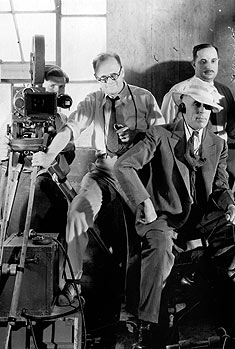 |
El 9è Seminari, que se celebrarà a Girona el novembre de 2013, està organitzat pel Museu del Cinema, el Departament de Geografia, Història i H. de l'Art de la Universitat de Girona i el Proyecto del Ministerio de Economía y Competitividad "La construcción del imaginario bélico en las actualidades de la Primera Guerra Mundial".
|


|

NECS 2013 Conference
Media Politics - Political Media, June 20, 2013
|
The conference will play host to a special panel series prepared by the HOMER network, an international group engaged for almost 10 years in promoting and developing the historical study of movie-going, exhibition, and reception.
|


|

Film-Philosophy Conference 2013:
Beyond Film
, July 10, 2013
|
Reflecting the synergy of filmmakers and philosophers within the field of film-philosophy, our conference will be structured around joined keynote talks by pairs of filmmakers and philosophers, who will open the floor for vibrant discussions with the conference participants.
|


|

Cosmopolitan Screens
University of Glasgow, 28-30 June, 2013
, June 28, 2013
|
The 23rd International Screen Studies Conference is organised by the journal Screen and will be programmed by Screen editors Tim Bergfelder, Dimitris Eleftheriotis, Alastair Phillips and Jackie Stacey.
|


|

Intersection
Contemporary Italy in Music, Art, Literature, and Cinema
, June 07, 2013
|
In a world that is made relentlessly more composite and multidimensional, the intersecting of art, cinema, music, and literature can help us re-configure rhythmically and synergetically the dissonant and discrete realities in which we are immersed.
|


|

Convegno Internazionale: I Situazionisti: Teoria, Arte e Politica
30 maggio 2013 - Facoltà di Lettere e Filosofia
Aula Verra
Via Ostiense 234- Roma, May 30, 2013
|
SEGRETERIA SCIENTIFICA:
Ivelise PERNIOLA
SEGRETERIA ORGANIZZATIVA:
Costantin JOPECK, Alice MARINELLI
|


|

Contemporary Women’s Cinema
Global Scenarios & Transnational Contexts
May 28-29, 2013
, May 28, 2013
|
Aula Magna del Rettorato
Via Ostiense 159
Rome
Humanities Institute
at Stoney Brook
Dipartimento di
Filosofia
Comunicazione
e Spettacolo
|


|

Videoludica e nuove forme della visione
Presentazione della rivista G|A|M|E – The Italian Journal of Game Studies, May 23, 2013
|
Il Master di I livello in "Video Full HD, 3D, immersivi e interattivi in ambienti di elevata convergenza e crossmedialità" dell’Università degli Studi Roma Tre incontra redattori e autori della rivista
G|A|M|E – The Italian Journal of Game Studies
|


|

Permanent Seminar on Histories of Film Theories Conference 2014 in Frankfurt, August 20-24 2014
Critical Thoery, Media and Film: Exploring the Frankfurt Legacy, August 20, 2014
 |
An international conference organized by the Institute for Theater, Film and Media at Goethe-Universität and the Institut für Sozialforschung, Frankfurt, in cooperation with the Permanent Seminar on Histories of Film Theories, August 20-24, 2014.
|


|

Hollywood and the World
A Diversity and Recognition Project - Second Global Conference, November 10, 2013
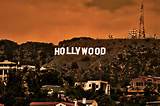 |
The popularity in Western culture of all things Hollywood reflects the eternal fascination with the world of Hollywood cinema. This inter-disciplinary research conference seeks to explore issues of Hollywood films and their international influence across historical periods and within cultural, political and social contexts both in the US and abroad. We are also interested in exploring this cinema in personal experience and interpersonal relationships and across a range of critical perspectives.
|


|

FILM AND MEDIA 2013: The Pleasures of the Spectacle
The Third Annual London Film and Media Confenrence 27-29/06/2013, June 27, 2013
 |
The Conference theme for 2013 is The Pleasures of the Spectacle. This major international conference will again seek to explore, celebrate and critique the screen-based traditions of film, TV and digital media in all their manifold dimensions. This pioneering annual conference is likely to be of considerable interest to established scholars, early career Faculty, young researchers, and anyone with a commitment to learning about global film and media in a dynamic and friendly academic context.
|


|

World Film 2013
International Conference on Film and Media
International Conference on Film and Media
International COnference on Film and Media, May 18, 2013
 |
The conference WORLD FILM 2013 is an interdisciplinary conference dedicated to film and media studies. The theme of the conference is Between Dreams and Reality. The conference is interdisciplinary and might be interesting for philosophers, film theorists and practitioners, psychologists, architects, artists, critics, journalists and all people interested in cinematography.
|


|

Second International Colloquium of the Permanent Seminar on the History of Film Theory
The Impact of Technological Innovations on the Theory and Historiography of Cinema, November 01, 2011
|
It is often repeated that before being an art, before being an
industry, cinema was initially a technology. At the beginning,
moreover, the camera was as intriguing as the illusion that
it managed to recreate. And if the initial fascination with the
cinematographic mechanism waned quickly, it resurfaces at regular
intervals following the emergence of each new technology that
changes the way films are produced, distributed or exhibited, and
even, more fundamentally, the way we think about cinema. Over
the past thirty years, several studies have traced the development
and socioeconomic consequences of new technologies which, year
after year, shape and redefine what cinema is. But what exactly is
the significance of all these kinds of machines and devices for the
theory and historiography of cinema? Have they helped open new
avenues of thinking and new methodologies or break down some
misconceptions at the heart of Film Studies? This colloquium seeks
to question the impact of technological innovations on the development
of the critical discourse and historiography of cinema.
The pervasiveness of the “technological” in the history and
theory of cinema demands its further investigation. The aim of
this colloquium is to evaluate the importance of technological
innovation in the articulation of a critical discourse in film studies.
More specifically, it seeks to comment on the impact caused by the
introduction of new technologies on the theory and historiography
of cinema, that is to say, to investigate how these technologies have
altered the way we think about cinema, its fundamental properties,
and its potential uses. Film scholars all know of the “four legendary
moments” of the technological history of film evoked by Peter
Wollen – the invention of the Lumière Cinematograph, the arrival
of sound, that of color, and finally the introduction of “widescreen”
formats – but how exactly have these shaped the discourse of
theorists, historians and other film critics? And what about other,
lesser known or forgotten innovations that have emerged at
various times in film history? We could not, moreover, neglect the
advent of digital technologies and CGI (computer generated images),
whose countless cinematographic applications caused major
upheavals in the course of reflection on cinema, upheavals whose
full extent has not yet been measured. The history of film theory is
punctuated with reflections that, occasioned by these technological
upheavals, manage to escape the extreme positions that are often
used to summarize the debate (technology as a “panacea” or as
a “scourge” of the modern world) and instead propose a more
nuanced and stimulating perspective on the fundamental properties of cinema.
|


|

XVIII International Film Studies Conference
The Archive
Memory, cinema, video and the image of the present, April 05, 2011
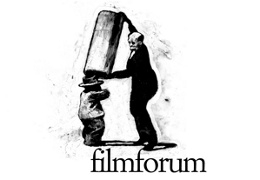 |
It was Jacques Derrida who reminded us that the word archive (Archè) combines the idea of beginning and that of command: the place where things get started, and where the sources reside, but at the same time the place where the Law arises and where it finds its dwelling.
In the regime of the image the archive is – in a single concept – the storage of recorded and transmitted images, but also what Jacques Rancière defines as «the organization of the sensible» (le partage du sensible); that instance which regulates, institutes and organizes the places and positions of access to the experience of the visual. Nevertheless the archive is not a one-dimensional concept: it is not only made by objects and concreteness, but also by void spaces, missing elements, silences, which preserve not only the transmittable history but also the trace of what could have been but was not and nevertheless continues to persist in the present times.
While a widespread tradition always understood history as a vertical narrative that emerges from an origin and is written like a book by a constituent subject; the archive appears as a radical dishomogeneity, irreducibly paratactic and organized through a vast multiplicity of elements.
|


|

Sergei Eisenstein’s Unpublished “Notes for a General History of Cinema”. World Premiere
September 30 – October 2, 2010, Columbia University, New York, NY
, ,
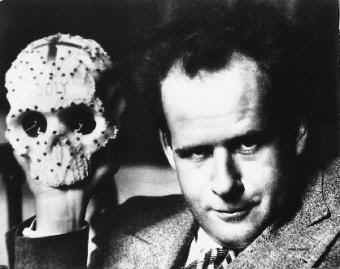 |
A Conference staging the critical reception by scholars in the field.
|


|

Women and the Silent Screen VI
University of Bologna, Italy, June 24, 2010 – June 26, 2010
, ,
 |
The Sixth International Women and the Silent Screen Conference will celebrate the diversity of women’s engagement with silent cinemas across the globe through a series of scholarly panels, keynote addresses, and archival film screenings.
Continuing the dynamic spirit that characterized previous conferences in Utrecht (1999), Santa Cruz (2001), Montréal (2004), Guadalajara (2006), and Stockholm (2008) the conference will provide an open and friendly atmosphere for the exchange of research and insight into women’s involvement in the first four decades of film history.
|


|

The Arthemis International Conference. "Moving Images Studies: History(ies), Method(s), Discipline(s)"
Concordia University, Montreal, June 4-7 2010, ,
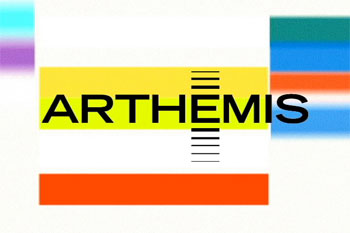 |
The ARTHEMIS conference wishes to offer an international forum for scholars to reflect on the theory and practice of film and moving image studies from historical and epistemological perspectives.
|


|

XVII International Film Studies Conference
March 16-18, 2010, January 12, 2010
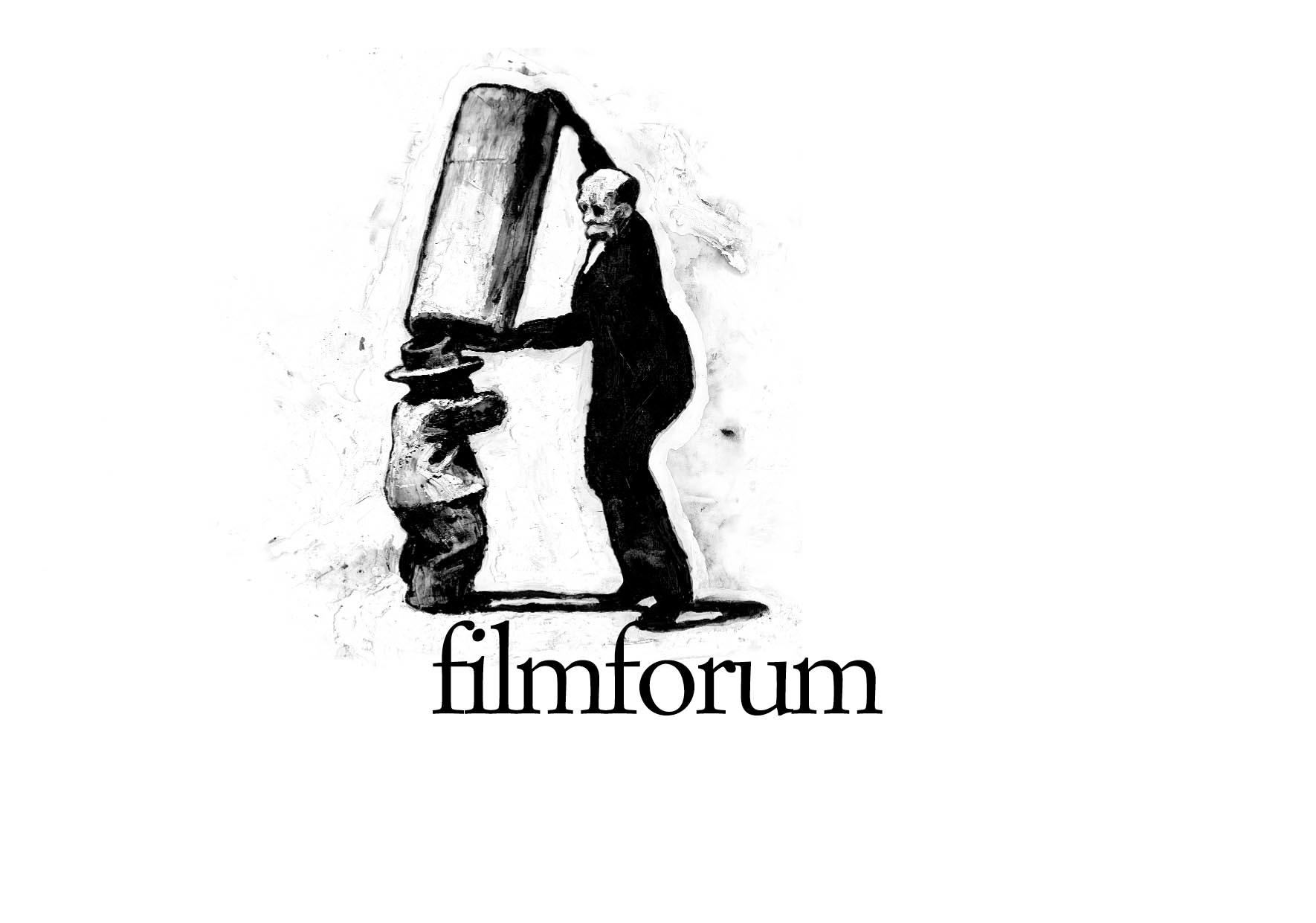 |
The Film Canon
|


|

XVI Udine International Film Studies Conference
Permanent Seminar on History of Film Theories
Udine, March 23, 2009
 |
Call for papers
|


|

Geographies of Film Theory
London, June 26 (evening) – June 28, 2008, ,
 |
The conference has been designed to engage specifically with intellectual fields that concern both the Institute of Germanic & Romance Studies and the Screen Studies Group through an examination of the development and diffusion of film theory.
|


|

Permanent Seminar on the History of Film Theories
XV Udine International Conference, March 03-04, 2009
 |
An international network gave life to a Permanent Seminar on the History of Film Theories. The XV Udine Conference will host on March 3 and 4 the first meeting organized by the seminar.
|


|

XV Udine Conference
Cinema and Comics. Affinities, differences and new forms of interference, March 03-06, 2008
 |
Interest in comparing cinema and comics is not new. At first glance, there are any number of apparent affinities and similarities between them.
|


|
|

